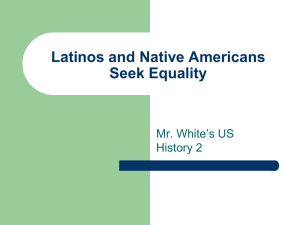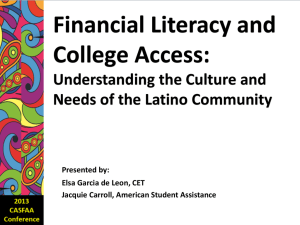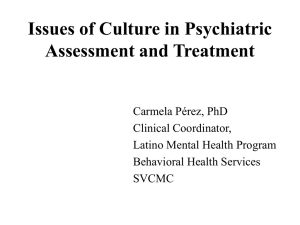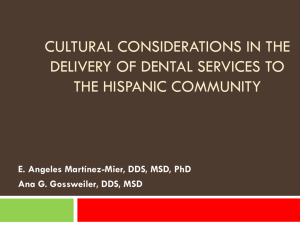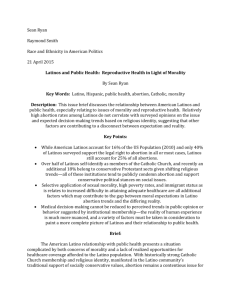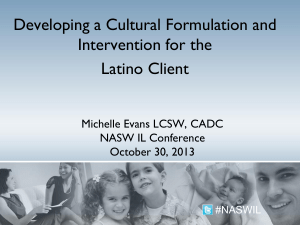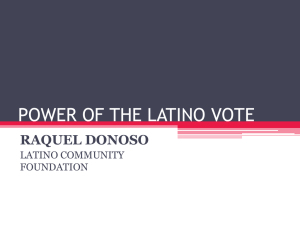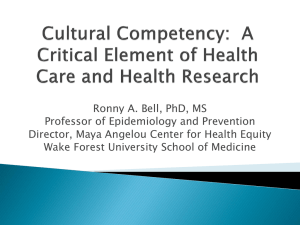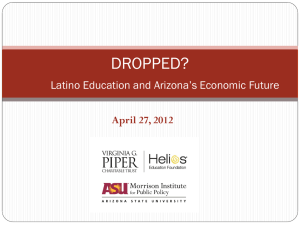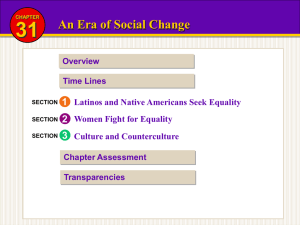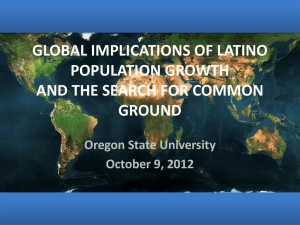MENTAL HEALTH OUTREACH PROGRAM FOR LATINOS: A
advertisement
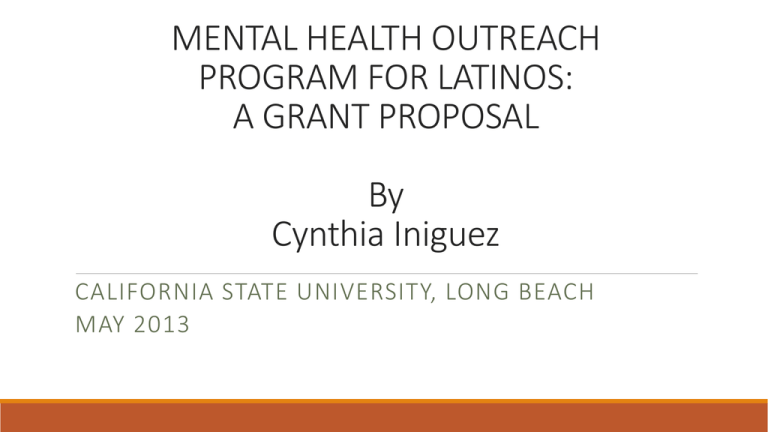
MENTAL HEALTH OUTREACH PROGRAM FOR LATINOS: A GRANT PROPOSAL By Cynthia Iniguez CALIFORNIA STATE UNIVERSITY, LONG BEACH MAY 2013 Introduction •Across the literature, studies suggest a disproportionately low number of Latinos receive mental health services (Cabassa, Zayas, & Hansen, 2006; Dupree, Herrera, Tyson, Yuri, & King-Kallimanis, 2010; Vega & Lopez, 2002). •The Agency for Healthcare Research and Quality (2005) found that even though mental illness is high among Latinos, fewer are receiving mental health services when compared to other ethnic groups. •A national survey conducted in 2010 found that 18.3% of Latinos in the United States suffer from mental illness (U.S. Department of Health and Human Services, 2010). •The National Alliance on Mental Illness (2003) found that less than 10% of Latinos with a mental illness seek care from a mental health specialist. •Latinos have been found to seek the help of a physician over a psychologist due to stigma associated with psychiatric disorders (Haig et al., 2003). •This proposed project seeks to increase knowledge of mental illness thus reducing the stigma associated with seeking mental health services. Social Work Relevance •Social workers will often come in contact with Latino clients who are suffering from mental illness. •It is of great importance that barriers that impede the access of mental health treatment are explored and understood. •By understanding these factors, social workers can begin to formulate strategies for improving mental health access among this population. •Developing a program that is specifically aimed at increasing knowledge of mental illness, treatment options, and resource availability for Latinos is a critical component when trying to improve the access of mental health services among this population. Cross-cultural Relevance •When specifically looking at Latinos, research has indicated a great disparity in mental health usage patterns of Latinos with that of other ethnic groups (Cabassa et al., 2006). •Several barriers such as cultural factors have been found to impede on this population’s access of services (Haig et al., 2003). •Further barriers specific to Latinos come in the form of immigrant status and language proficiency (Folsom et al., 2007; Shattel et al., 2008). •These barriers that impede access to mental health services need to be addressed since Latinos are at a high risk for developing mental health problems (Haig et al., 2003). Methods •a. Target Population • Latino adults, 18 and over, who may be suffering from mental illness and who are eligible for the Behavioral Health Program at St. John’s Well Children & Family Center. •b. Strategies used to identify and select a funding source • Internet search engines utilizing the following key terms, “grants” ,” “grants for Latinos,” “mental health grants,” and “mental health grants for Latinos” . •c. Identify the funding source selected • The California Endowment since it has previously funded programs aimed at addressing the mental health needs of ethnic minorities. •d. Sources used for the needs assessment • Government websites and scholarly journals with a focus on mental health needs and services among Latinos. Methods •e. Projected budget range and categories Expenses (1 year) Amount Personnel Non-Personnel Amount Program Manager (MSW)-FTE $50,000 Office Supplies $1,000 Employee-Related Benefits (@ 30%) $15,000 Rent($700/mo) $8,400 Case Manager (BSW)- FTE $30,000 Utilities($100/mo) $1,200 Employee-Related Benefits (@30%) $9,000 Training $5,000 Community Outreach Worker X 2- FTE @ $13/hour $49,920 Printing $5,000 Employee-Related Benefits (@30%) $14,976 Equipment ($1,200/computer) x 4, ($150/printer)x 2 $5,100 Independent Evaluator $5,000 Total Personnel $173,866 Indirect cost Administrative Overhead (10% of total budget) $19,956 Total Non-Personnel Total Program Cost $25,700 $219,555 Grant Proposal •a. Program Summary and Description • The program will provide mental health education and community outreach for Latinos in need of mental health services. • Educational presentations will be conducted and informational pamphlets will be disseminated at local community centers, churches, health fairs, and clinics. • Outreach efforts will link individuals and families in need of mental health services with case management services. •b. Population Served • Latino adults, 18 and over, who may be suffering from mental illness and who are eligible for the Behavioral Health Program at St. John’s Well Children & Family Center. •c. Sustainability •Collaboration with the Behavioral Health Program at St. John’s Well Children & Family Center to continue informational and outreach services for Latinos with mental illness. Grant Proposal •d. Program Objectives • To provide mental health education over a one year period to Latino adults, living in South Los Angeles and surrounding communities about mental health diagnosis, symptoms, and treatment option. • To provide information to Latinos through the course of one year in South Los Angeles and surrounding communities about mental disorders, treatment options, and available resources within the community. • To assist Latinos by linking them to the necessary mental health services. •e. Program Evaluation • Sign in sheets and pre and posttest workshop evaluation forms will be gathered at each educational presentation. • The amount of informational brochures and pamphlets disseminated at health fairs will be tracked. • Case manager will submit weekly reports to the Program Manager which will include information regarding service delivery. • An Independent Evaluator will be hired to evaluate and assess the effectiveness of the program Lessons Learned/Implications for Social Work •Lessons Learned • The importance of conducting a needs assessment. • The necessity of professional written communication. • The importance of selecting a host agency whose programs and services are in alignment with the needs of the target population. • How to plan and develop a new program. •Implications for Social Work • Social workers are often limited in assistance to clients due to a shortage or unavailability of funds. • Grant writing is a means for which social worker can become involved in the process of developing and implementing programs that meet the needs of the population being serviced. References Agency for Healthcare Research and Quality. (2005). National healthcare disparities report. Retrieved from http://qualitytools.ahrq.gov/disparitiesreport Cabassa, L. J., Zayas, L. H., & Hansen, M. C. (2006). Latino adults’ access to mental healthcare: A review of epidemiological studies. Administration and Policy in Mental Health and Mental Health Services Research, 33, 316–330. Dupree, L. W., Herrera, J. R., Tyson, D., Yuri, J., & King-Kallimanis, B. L. (2010). Age group differences in mental health care preferences and barriers among Latinos: Implications for research and practice. Best Practice in Mental Health, 6(1), 47-59. Folsom, D. P., Gilmer, T., Barrio, C., Moore, D. J., Bucardo, J., Lindamer, L. A., & Jeste, D. V. (2007). A longitudinal study of the use of mental health services by persons with serious mental illness: Do Spanish-speaking Latinos differ from English-speaking Latinos and Caucasians? American Journal of Psychiatry, 164(8), 1173-1180. Haig, K., Byron L. Z., & David J. H. (2003). Barriers to community mental health services for Latinos: Treatment considerations. Clinical Psychology: Science & Practice, 10(4), 394-422. National Alliance on Mental Illness (2003). Latino community mental health facts. Arlington, VA: Author. Retrieved from http://www.nami.org/Content/Content Groups/MIO/Fact_Sheets1/Lation_MH_Disparities_2003.pdf. Shattell, M. M., Hamilton, D., Starr, S. S., Jenkins, C. J., & Hinderliter, N. (2008). Mental health service needs of a Latino population: A community-based participatory research project. Issues In Mental Health Nursing, 29(4), 351-370. U.S. Department of Health and Human Services (2010). Results from the 2010National Survey on Drug Use and Health: Mental health findings. Rockville, MD: DHHS. Vega, W. A., & Lopez, S. R. (2002). Priority issues in Latino mental health services research. Mental Health Services Research, 3(4), 189–200.

